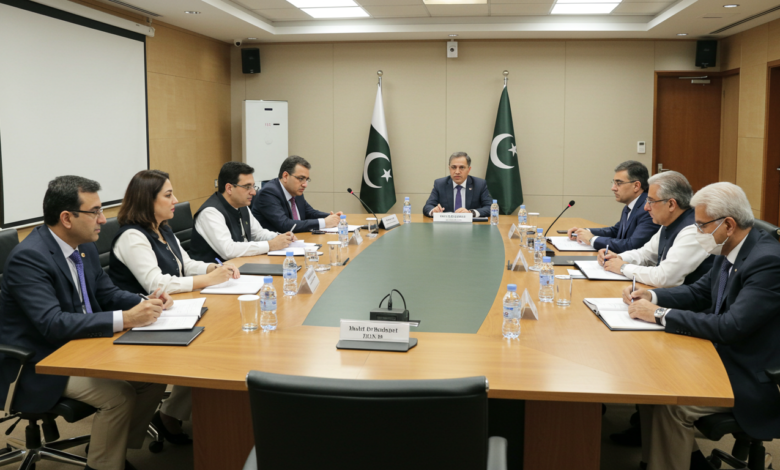Pakistan, IMF Open Talks on Budget Finalisation

Introduction: A Crucial Juncture for Pakistan’s Economy
Pakistan has officially initiated discussions with the International Monetary Fund (IMF) on finalizing its upcoming national budget. These talks are pivotal, not only for fiscal planning but also for ensuring the continuation of crucial IMF support. Amid economic headwinds, spiraling inflation, and mounting debt, Pakistan seeks to align its budgetary framework with the IMF’s strict reform requirements.
The stakes are high. With a history of economic instability, the 2025–26 budget could determine whether Pakistan can secure a sustainable financial future or slip deeper into crisis.You know about theglobespot, andaazdaily, openrendz and pakistan imf budget talks also Buzzfeed.
Why These Budget Talks Matter
The IMF is more than a financial backer—it’s a gatekeeper for international credibility. The success of Pakistan’s budget negotiations with the IMF will directly impact:
-
The release of future loan tranches.
-
Foreign investor confidence.
-
The rupee’s value.
-
Inflation forecasts.
-
Domestic policy continuity.
As the talks commence, both parties are weighing their priorities, with the IMF emphasizing revenue generation, fiscal discipline, and structural reforms.
The Context: Pakistan’s Economic Crossroads
Over the past year, Pakistan’s economy has teetered on the edge. With foreign exchange reserves dipping below $9 billion at one point, and a soaring current account deficit, the country urgently needs external financing.
Despite some improvement due to administrative controls and import restrictions, core economic issues remain unresolved:
-
Low tax collection (just ~9% of GDP).
-
Heavy reliance on indirect taxation.
-
Ballooning debt servicing costs.
-
Persistent energy sector losses.
Against this backdrop, the IMF has stepped in once more to guide Pakistan’s fiscal direction.
Key Focus Areas of the Talks
1. Tax Reforms
The IMF’s central demand is expanding the tax net. Pakistan currently relies heavily on indirect taxes such as sales tax and fuel levies. However, the IMF insists on:
-
Broadening direct taxation.
-
Bringing real estate, retail, and agriculture into the tax framework.
-
Reducing tax exemptions.
The Federal Board of Revenue (FBR) has been tasked with preparing a roadmap to increase tax revenue by over Rs2 trillion in the coming fiscal year.
2. Subsidy Rationalisation
Subsidies in Pakistan, particularly for fuel and electricity, have strained public finances. The IMF recommends:
-
Phasing out untargeted subsidies.
-
Shifting to a targeted cash transfer system (via BISP).
-
Eliminating cross-subsidies between commercial and residential electricity consumers.
3. Energy Sector Reforms
Pakistan’s circular debt in the power sector exceeds Rs2.6 trillion. The IMF seeks action on:
-
Reducing line losses.
-
Timely tariff adjustments.
-
Increasing cost recovery through smart meters.
The budget is expected to include reforms to address these inefficiencies.
The Government’s Budget Strategy
Finance Minister Muhammad Aurangzeb has stated that the upcoming budget will be “growth-friendly but reform-centric.” Here are the pillars of the government’s strategy:
-
Revenue Mobilisation: Higher petroleum levies and withholding taxes on non-filers.
-
Expenditure Control: Downsizing government departments and reducing non-essential spending.
-
Social Safety: Increasing allocations for BISP and other poverty alleviation programs.
-
Investment Incentives: Offering tax breaks for IT exports and manufacturing.
The challenge lies in balancing reform with public tolerance amid high inflation.
Where the IMF Stands
The IMF has been clear about its expectations. In a statement, IMF Mission Chief Nathan Porter said, “Our support depends on credible, consistent, and comprehensive reform commitments.”
Specifically, the IMF wants:
-
A primary fiscal surplus of at least 0.4% of GDP.
-
Cuts in unfunded spending.
-
Better coordination between federal and provincial fiscal policies.
-
No new tax amnesties or populist schemes.
These conditions are non-negotiable if Pakistan wishes to transition into a long-term Extended Fund Facility (EFF) post-June.
Challenges in Finalising the Budget
Political Pressures
The current coalition government is already facing mounting political pressure. With the next general elections approaching, raising taxes or cutting subsidies may alienate voters.
Public Discontent
Fuel price hikes, inflation exceeding 30%, and unemployment have eroded public patience. A “tough budget” could lead to mass protests, particularly in urban centers.
Provincial Coordination
Provincial governments often resist revenue collection mandates, especially in agriculture and services sectors. The IMF, however, insists that all tiers of government align with the federal fiscal strategy.
Public and Market Reactions
Stock Market
Initial signals of budget talks have boosted investor confidence. The Pakistan Stock Exchange (PSX) recorded a modest rise, anticipating continued IMF backing.
Currency Markets
The Pakistani rupee has remained stable due to expectations of IMF support and inflows. But this could change if talks stall or fail.
Public Opinion
Social media is abuzz with criticism. Hashtags like #IMFBudget and #BudgetBurden2025 are trending, with citizens fearing further economic hardship.
Comparative Insights: IMF Talks in Other Countries
Pakistan is not alone in navigating tough IMF negotiations. Countries like Egypt, Argentina, and Sri Lanka have faced similar situations.
Key lessons from their experiences:
-
Reform credibility determines investor response.
-
Social protection is vital to maintain public trust.
-
Premature withdrawal from reform paths leads to repeat bailouts.
Pakistan’s planners are reportedly studying these models to avoid past mistakes.
The Opposition’s Take
Opposition parties, especially PTI and JUI-F, have condemned the government for “surrendering to IMF dictations.” They argue that:
-
Tax hikes hurt the poor.
-
Subsidy cuts benefit the elite.
-
Reforms lack transparency.
However, critics have yet to offer a credible alternative path.
What Citizens Should Expect
The 2025–26 budget is likely to include:
-
Increase in petroleum development levy (PDL).
-
Higher taxes on salaried individuals earning over Rs200,000/month.
-
Property tax reforms.
-
Removal of tax exemptions on luxury imports.
-
Expansion of GST to more goods and services.
However, there may also be relief:
-
Enhanced BISP support.
-
Conditional cash transfers for fuel and utility bills.
-
Increased minimum wage.
Expert Opinions: Is There a Way Out?
Economists agree that reforms are essential. Dr. Hafeez Pasha argues that “Pakistan can’t grow without tax compliance.” Similarly, Dr. Ishrat Hussain suggests:
“Rather than fearing the IMF, we should use this moment to reset our economy.”
However, implementation is the key. Without political will and administrative capacity, even the best budget plans could falter.
Digitalisation: A Hidden Asset in Budget Reforms
The government is also considering digital tools to improve revenue collection:
-
AI-based auditing by FBR.
-
Integration of NADRA and FBR databases.
-
Real-time POS tracking in retail.
-
E-filing promotion through incentives.
Such innovations can help Pakistan move away from manual leakages and broaden its tax base efficiently.
The Road to Extended IMF Program
The current IMF standby arrangement expires in June. To secure a long-term EFF, the upcoming budget must:
-
Show revenue discipline.
-
Commit to long-term reform plans.
-
Demonstrate political consensus.
The EFF would unlock up to $6 billion over three years—crucial for foreign reserve stability and investor confidence.
Conclusion: Budget Talks That Could Shape the Nation’s Future
Pakistan’s budget negotiations with the IMF are more than an annual ritual—they are a test of intent. The choices made in the coming weeks will determine:
-
Whether Pakistan breaks the cycle of debt and bailouts.
-
Whether the poor are protected amid reform.
-
Whether the country moves toward a stable, self-reliant economy.
If the government balances reform with compassion and executes with integrity, this budget could mark a turning point in Pakistan’s economic story.



